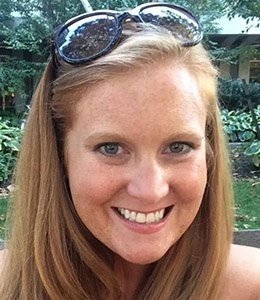Kate Beishline

- Title(s)
- Associate Professor of Biology & Chair of the Biological and Health Sciences Department
- Department
- Education
Ph.D., Drexel University College of Medicine
B.S., University of the Sciences
- Contact Information
-
- Bloomsburg
- 570-389-4400
- Send an Email
-
117 Hartline Science Center
Academic Areas
- Cell Biology Lecture and Laboratory, Anatomy and Physiology 1 Laboratory, Animal Cell Physiology
- Faculty Coordinator of Science in Motion
Research Interests
Our lab is generally interested in pathways and mechanisms in cellular biology that regulate aging and pathways which can contribute to cancer cell formation and survival. Our current research interests are focused on pathways which regulate the transcription and replication of eukaryotic telomeres. More specifically we are studying the mechanisms by which a genome binding factor CTCF, and its only paralog BORIS are participating in the maintenance of telomere structures and how these functions may be important in cancer and normal cellular aging. Undergraduate and graduate students in our lab are learning a variety of techniques including human cell culture, confocal microscopy, and quantitative qPCR to study these mechanisms and gain experience in a molecular biology laboratory setting.
Recent Publications
- Swift M, Beishline K, Flashner S, Azizkhan-Clifford J. DSB repair pathway choice is regulated by recruitment of 53BP1 through cell cycle-dependent regulation of Sp1. Cell Reports. 16 March 2021. Vol. 34, Issue 11: 108840
- Swift M, Beishline K, Azizkhan-Clifford J. Sp1-dependent recruitment of the histone acetylase p300 to DSBs facilitates chromatin remodeling and recruitment of the NHEJ repair factor Ku70. DNA Repair. July 2021. 205(Suppl 1):103171
- Tutton S, Deng Z, Gulve N, Vladimirova O, Beishline K, Wiedmer A, Murphy M, Lieberman PM. Elevated telomere dysfunction in cells containing the African-Centric Pro47Ser Cancer-risk variant of TP53. Oncotarget. 2019 Jun 4; 10(38): 3581–3591.
- Torabi B, Flashner S, Beishline K, Sowash A, Donovan K, Bassett G, Azizkhan-Clifford J. Caspase cleavage of transcription factor Sp1 enhances apoptosis in response to DNA damage. Apoptosis. 2018 Jan;23(1):65-78
- Beishline K, Vladimirova O, Tutton S, Wang Z, Deng Z, Lieberman PM. CTCF driven TERRA transcription facilitates completion of telomere DNA replication. Nature Communications. 2017; 8:2114
Jessica S. and Stephen R. Kozloff Faculty Fellow
Beishline from the Department of Biological and Allied Health Services received her Bachelor of Science from the University of the Sciences and her doctorate from Drexel University College of Medicine. Beishline’s academic areas include general biology, cell biology, and anatomy and physiology. She also does research regarding telomeres, transcription and DNA replication, cellular aging, and cancer biology. Her current research interests are focusing on the pathways which regulate the transcription and replication of eukaryotic telomeres. She is focused on the mechanism by which the genome binding factor CTCF, and its only paralog BORIS, are participating in the maintenance of telomere structures and how these functions may be important in cancer and normal cellular aging.
